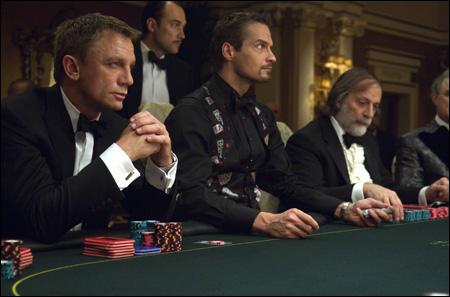
THE RIGHT MAN?: Craig goes from callow to cynical in the course of Casino.
|
Every era gets the James Bond it deserves. Ours gets a Bond who’s strong and forceful but also reckless and arrogant, who blunders into tricky situations in Third World countries and makes a bloody mess of things.
Okay, no one goes to a James Bond movie for its geopolitical insights, but Casino Royale is still the meatiest Bond movie in ages, not just because of its real-world resonance but also because it strips the franchise of its credibility-defying excess to focus on character.
Casino is, of course, a restart, taking the series back to Ian Fleming’s first 007 novel. Here the young Bond, who’s just made the first two kills that earned him a promotion to double-0 status, is only beginning to discover tailored suits and Aston Martins, and he doesn’t yet care whether his martini is shaken or stirred. By the end of the film, he’s becoming the Bond we know, who kills easily, who’s much more guarded and careful around women and enemies, whose job and romantic betrayals have scarred his soul, who’s coolly cynical about everything except his love of country.
Daniel Craig is surely the closest the franchise has come to Bond as Fleming conceived him, displaying the macho bluster Sean Connery’s portrayal emphasized and the grimly efficient violence of Timothy Dalton. Plus, he looks smashing in a dinner jacket or a wet swimsuit. He’s the right man for the job.
ADVERTISEMENT
 |
The plot is also faithful to Fleming’s novel, which proves relevant even in a post–Cold War context. In 2006, villain Le Chiffre (Mads Mikkelsen), whom Bond must bankrupt at the gaming table (Texas hold ’em now, not baccarat), is a money launderer for terrorists, not Communists, but the sense of a shadowy organization bent on the destruction of the West remains. So does the pervasive paranoia, a sensibility that also owes a debt to newer spy dramas (the Bourne series, 24) and to contemporary life. The characters never escape the watch of omnipresent surveillance cameras, and Bond harvests many clues from his enemies’ cellphone records. With such everyday tools, it doesn’t take fantastic gadgetry from Q to learn people’s secrets.
Bond cannot, however, read fellow British agent Vesper Lynd (Eva Green). Her mysterious motives owe partly to the story and partly to Green’s cagy performance, which is full of emotional misdirection until she reveals all through her gestures in a poignant and wordless final sequence.
Some credit for the characterizations belongs to co-screenwriter Paul Haggis (Crash, Million Dollar Baby), who was brought in to play up the relationships over the genre mechanics. That may sour some action fans on the film: though the first hour rushes headlong with spectacular action sequences, the second slows down for the more static psychological drama of the poker table. Martin Campbell, who rebooted the franchise before with GoldenEye, again handles the job with cool polish, but he can’t do much with the Fleming-derived story structure. Still, he brings Casino Royale to a close with a stunning action sequence in a sinking Venetian palazzo, and the final shot, in which Craig gets to deliver one of 007’s signature lines, is satisfying and redeems all. In that moment, a spy is born.